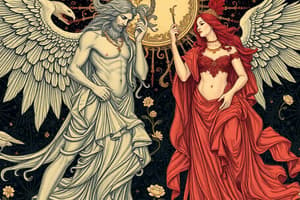Podcast
Questions and Answers
Who is known as the king of the gods in Greek mythology?
Who is known as the king of the gods in Greek mythology?
- Hades
- Apollo
- Poseidon
- Zeus (correct)
What is the primary theme depicted in the myth of Persephone and Hades?
What is the primary theme depicted in the myth of Persephone and Hades?
- The Trojan War
- Heroism
- The nature of fate
- The cycle of seasons (correct)
Which goddess is associated with wisdom and warfare?
Which goddess is associated with wisdom and warfare?
- Athena (correct)
- Demeter
- Aphrodite
- Artemis
What does the lightning bolt symbolize in Greek mythology?
What does the lightning bolt symbolize in Greek mythology?
What is a major consequence of religious rituals in ancient Greek culture?
What is a major consequence of religious rituals in ancient Greek culture?
Which myth is associated with a ten-year conflict over the abduction of a woman?
Which myth is associated with a ten-year conflict over the abduction of a woman?
What duality is frequently represented by the gods in Greek mythology?
What duality is frequently represented by the gods in Greek mythology?
Which animal is associated with the goddess Athena?
Which animal is associated with the goddess Athena?
Flashcards are hidden until you start studying
Study Notes
Overview of Greek Mythology
- Collection of myths originating from ancient Greece.
- Explains the origins of the world, gods, heroes, and rituals.
- Fundamental to Greek culture, religion, and art.
Major Gods and Goddesses
- Zeus: King of the gods; god of the sky and thunder.
- Hera: Queen of the gods; goddess of marriage and family.
- Poseidon: God of the sea, earthquakes, and horses.
- Demeter: Goddess of agriculture and the harvest.
- Athena: Goddess of wisdom, warfare, and crafts.
- Apollo: God of the sun, music, poetry, and prophecy.
- Artemis: Goddess of the hunt, wilderness, and childbirth.
- Ares: God of war.
- Aphrodite: Goddess of love and beauty.
- Hades: God of the underworld.
Important Myths and Stories
- Creation Myths: Theogony by Hesiod describes the origins of the universe and the rise of the gods.
- Hercules (Heracles): Known for his twelve labors and strength; a demigod.
- Persephone and Hades: Myth explaining the seasons through the cycle of Persephone's descent into the underworld.
- The Trojan War: A ten-year conflict sparked by the abduction of Helen; prominently featured in Homer's "Iliad."
- Odyssey: Odysseus's journey home from the Trojan War; themes of adventure and the struggle for identity.
Themes and Concepts
- Duality of Nature: Many gods represent opposing forces (e.g., creation vs. destruction).
- Heroic Ideals: Exploration of bravery, honor, and the tragic flaws of heroes.
- Fate vs. Free Will: Characters often struggle against their fates, reflecting on human destiny.
Influence on Culture
- Literature: Inspired countless works across genres, from ancient texts to modern adaptations.
- Art: Depictions in sculpture, pottery, and painting often portray mythological scenes.
- Philosophy: Myths influence moral questions and philosophical thought, particularly in the works of Plato and Aristotle.
Symbols and Animals
- Symbols: Lightning bolt (Zeus), olive tree (Athena), trident (Poseidon).
- Animals: Eagles (Zeus), owls (Athena), dolphins (Apollo).
Conclusion
Greek mythology remains a rich source of stories and moral lessons, deeply embedded in Western culture and providing insights into ancient Greek civilization.
Greek Mythology Overview
- Collection of myths originating from ancient Greece that explain the origins of the world, gods, heroes, and rituals.
- Fundamental to Greek culture, religion, and art.
Major Gods and Goddesses
- Zeus: King of the gods, god of the sky and thunder.
- Hera: Queen of the gods, goddess of marriage and family.
- Poseidon: God of the sea, earthquakes, and horses.
- Demeter: Goddess of agriculture and the harvest.
- Athena: Goddess of wisdom, warfare, and crafts.
- Apollo: God of the sun, music, poetry, and prophecy.
- Artemis: Goddess of the hunt, wilderness, and childbirth.
- Ares: God of war.
- Aphrodite: Goddess of love and beauty.
- Hades: God of the underworld.
Important Myths and Stories
- Creation Myths: Hesiod's Theogony describes the origins of the universe and the rise of the gods.
- Hercules (Heracles): Known for his twelve labors and strength; a demigod.
- Persephone and Hades: Myth that explains the seasons through the cycle of Persephone's descent into the underworld.
- The Trojan War: A ten-year conflict sparked by the abduction of Helen; prominently featured in Homer's Iliad.
- Odyssey: Odysseus's journey home from the Trojan War; themes of adventure and the struggle for identity.
Themes and Concepts
- Duality of Nature: Many gods represent opposing forces (e.g., creation vs.destruction).
- Heroic Ideals: Exploration of bravery, honor, and the tragic flaws of heroes.
- Fate vs.Free Will: Characters often struggle against their fates, reflecting on human destiny.
Influence on Culture
- Literature: Inspired countless works across genres, from ancient texts to modern adaptations.
- Art: Depictions in sculpture, pottery, and painting often portray mythological scenes.
- Philosophy: Myths influence moral questions and philosophical thought, particularly in the works of Plato and Aristotle.
Symbols and Animals
- Symbols: Lightning bolt (Zeus), olive tree (Athena), trident (Poseidon)
- Animals: Eagles (Zeus), owls (Athena), dolphins (Apollo).
Studying That Suits You
Use AI to generate personalized quizzes and flashcards to suit your learning preferences.




